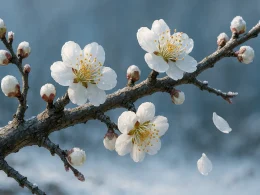Toward a mist upon the water
Still I wave my hand and sob,
For the flying bird is lost in space
Beyond a desolate green mountain....
But now the long river, the far lone sail,
five lakes, gleam like spring in the sunset;
And down an island white with duckweed
Comes the quiet of communion.
Original Poem
「饯别王十一南游」
刘长卿
望君烟水阔, 挥手泪沾巾。
飞鸟没何处? 青山空向人。
长江一帆远, 落日五湖春。
谁见汀洲上, 相思愁白苹?
Interpretation
This farewell poem was composed for the poet's friend Wang Shiyi, likely following a riverside parting banquet. Rather than depicting the farewell feast directly, the poet centers on the moment of watching the departing journey, using natural imagery to evoke the melancholy of separation. Sincere in emotion and rigorous in structure, the work stands as a masterpiece among farewell poems for its vivid pictorial quality.
First Couplet: "望君烟水阔,挥手泪沾巾。"
Wàng jūn yān shuǐ kuò, huīshǒu lèi zhān jīn.
Watching you vanish in mist-wreathed waters wide / Waving, my scarf grows damp with tears untied
The couplet directly expresses the poet's emotions as he stands on the riverbank. The expansive "mist-wreathed waters" mirror the growing distance, while the physical act of waving and tear-stained scarf externalize inner sorrow. The parallelism between visual disappearance and emotional outpouring creates poignant immediacy.
Second Couplet: "飞鸟没何处?青山空向人。"
Fēi niǎo mò hé chù? Qīngshān kōng xiàng rén.
Where vanishes the winging bird from sight? / Green hills stand vacant against human plight
The "winging bird" becomes a metaphor for the departing friend, its disappearance symbolizing uncertain communication. The rhetorical question "where vanishes" emphasizes concern for the traveler's unknown destination, while "vacant hills" personify nature's indifference to human separation, deepening the loneliness.
Third Couplet: "长江一帆远,落日五湖春。"
Chángjiāng yī fān yuǎn, luòrì Wǔ hú chūn.
On Long River one sail fades from view / Setting sun gilds Five Lakes' springtime hue
Transitioning from observation to imagination, the poet visualizes the friend's journey ahead. The singular "one sail" emphasizes solitude, while "Five Lakes' springtime" suggests the traveler's eventual beautiful destination. This imaginative projection extends emotional connection across physical distance.
Fourth Couplet: "谁见汀洲上,相思愁白蘋?"
Shuí jiàn tīngzhōu shàng, xiāngsī chóu bái pín?
Who sees on yonder shoal so fair / My lovesick gaze on white duckweed there?
The conclusion returns to the poet's solitary vigil on the sandbar. The "white duckweed" - traditional symbol of parting - materializes his lingering sorrow. The rhetorical question "who sees" underscores the private, unshared nature of grief, completing the emotional arc from shared farewell to solitary remembrance.
Holistic Appreciation
The poem masterfully structures its emotional progression around the act of watching: initial sight (I), lost sight (II), imagined sight (III), and finally unseen sorrow (IV). Avoiding direct mention of farewell, it conveys separation entirely through natural imagery - mists, birds, sails, and aquatic plants becoming vessels of emotion. This indirect expression achieves profound resonance, making the personal experience universally relatable through nature's language.
Artistic Merits
- Scenic Emotionalism: River mists and duckweed transform into emotional signifiers
- Perspectival Symphony: Shifting views from observer to imagined journey to return
- Symbolic Economy: Single sail and lone bird powerfully represent separation
- Circular Composition: Opening and closing water imagery creates emotional completeness
Insights
The poem reveals how profound emotion often resides in quiet observation rather than dramatic declaration. Its modern relevance lies in the universal experience of watching loved ones depart - whether through travel, life changes, or mortality. The poet's technique of encoding feelings in natural phenomena suggests that in our digital age, perhaps we've lost some capacity for this meditative, nature-mediated emotional processing. The work ultimately teaches that true connection persists beyond physical presence, carried in memory's "white duckweed" of contemplation.
Poem translator
Kiang Kanghu
About the poet

Liu Zhangqing (刘长卿) was a native of Xian County, Hebei Province. He studied at Mt. Songshan when he was young, and later moved to Jiangxi, where he received his bachelor's degree in 733 A.D. He also belonged to the Wang and Meng school of poetry. His poems belonged to the school of Wang and Meng, and he was most famous for his five-character poems, and was also most conceited, once thinking that he was "the Great Wall of five-character poems", which meant that no one could surpass him.












